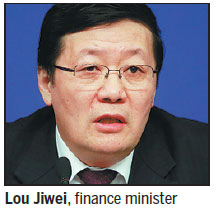Minister says property tax is 'next task'
The government's determination to launch the long-awaited property tax would help cool down the real estate market in the long term, industry analysts said.
Speaking on the sidelines of the G20 Finance Ministers and Central Bank Governors Meetings in Chengdu, Sichuan province, Finance Minister Lou Jiwei pledged to go to great lengths to introduce the property tax.
Promoting the reform of income tax and property tax will ensure fairer income distribution. However, effective policies for income redistribution will definitely meet obstacles, Lou said. "This is a challenge, and this is our next task. We will be devoted to carrying it on."
The property tax is predicted to take effect by the end of 2017 at the earliest, Liu Jianwen, a professor at Peking University Law School, was quoted as saying by China Business News.
Experts said the policy could help reduce demand and stabilize prices to some extent. But it make take some time before the long-awaited property tax can be implemented.

"Information collection, taxation capacity building and vested interests are the major challenges," Lou pointed out.
"It's difficult to say when the policy will be completed. As far as I'm concerned, the reform may need no less than three to five years," said Zhang Dawei, chief analyst at Centaline Property.
The taxation system needs improvement and requires thorough investigation into the current property ownership, added Guo Yi, marketing director at Yahao Real Estate Selling & Consulting Solution Agency.
However, the policy's ability to restrain demand remains to be proven.
"I will still buy a house even if there are more taxes, because I need it," said Li Yanan, an engineer working at a Beijing-based construction company.
Besides the property tax, the reform of individual income tax has become another factor that analysts refer to when predicting market trends.
Guo said that the reform would help boost individual demand.
Contact the writers at [email protected] and [email protected]
























